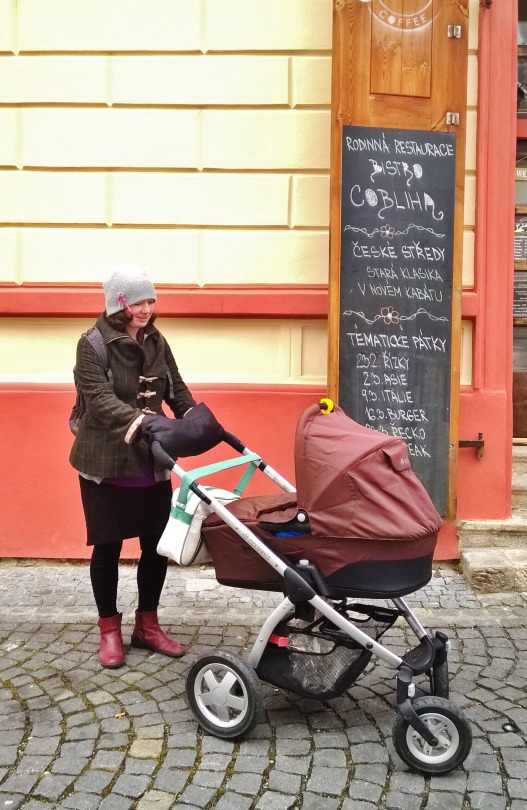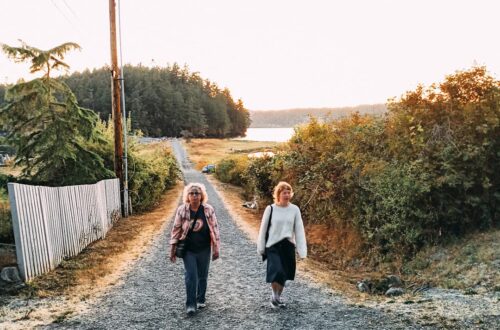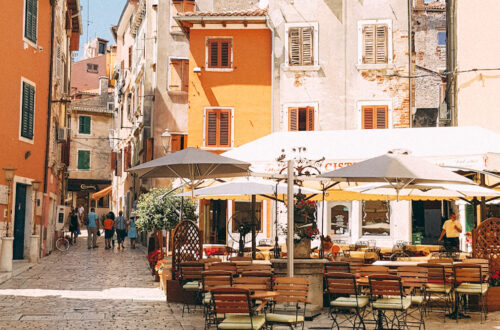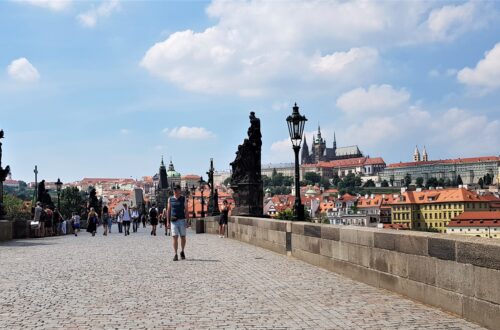mamahood in the czech republic: Q&A

no, this isn’t a cheeky pregnancy reveal. i am so pleased to have had a great chat with my friend natalie, originally from england and living in české budějovice, who recently became a mum back in the autumn.
i thought it would be really interesting to hear her thoughts on pregnancy and giving birth in her adopted country. at least compared to my home country, there are loads of differences between it and the czech republic in terms of maternity policies from the outset. you may not know that the czech republic has the most generous maternity leave in europe: the first six months are paid leave at 70% of your salary, and then parental leave follows (which can be interchangeable among parents) continues between six months to three years (paid, but at a much lower rate than that stated above depending on how long you choose).
this interview focuses more on the birth: before, during, and what it was like to stay in a czech hospital for ten days. from matronly soap opera-style nurses to essential preparedness steps, let’s get to it!
did you think you would have a child in a different country?
yes, i always thought it was – in a romantic way – kind of a good idea to have children in a country different to your own. it could be much more interesting to have children in a different culture… i thought it would be a good thing to do. although i’m beginning to second guess that.
oh no!
well, i think when you get older you just start to really value [your] family, security…. when you’re young, wherever you’re from is just, like, boring and rubbish and you just want to get out and see something new. i don’t think that england is rubbish anymore. when you’re away a long time, you start missing your people. the people, for example that like the same music as you, who have the same cultural background, and these things you don’t notice when you’re living there because that just is the cultural background of the place.
my mum comes all the time, especially now that we’ve got the baby. when i first moved here, she came a few times a year, but it’s even more now.
do feel like you still have that family support being a ways from family?
yes, definitely, and i think i really have started to value it more. you take for granted being in the same town as your family. when your family is a ways away, i think it does deepen the relationship because you’re trying to spend that quality time, trying to utilise it wisely and try to ask them things you’ve been wanting to. i guess you just don’t take them for granted.
so it wasn’t having a child here made you miss being in england but it was just the span of time you were away?
yeah, i think even before i had my child. in a contrast to when i was in my twenties and on my way out– very much just wanting to go out, explore, and learn new things. i think when you’re a bit older you start to push back a bit and start thinking about my family more. i’ve been thinking a lot about this for maybe the last two years or so.
can you tell us a little bit about pre-natal care you experienced in the czech republic? i guess it would be hard because you don’t have anything to compare it to…
i do actually because I hear about it from my sister in the UK a lot.
what was your experience like?
quite good. when my sister was pregnant, i heard about this a lot – all the classes such as pregnancy yoga… and everything she talked about was found here in budejovice. i went to a really good six week class about birth, breastfeeding, it was nice — it packed in so much information– and i also went to this nice, very gentle aerobics session. so, to be honest, i think pregnancy and birth in britain has become such a massive industry so there’s probably more on offer there compared to here… but i think it’s all here if you look for it. you obviously have to speak czech, though, to take advantage of it… maybe in prague there would be more in english.
i had a really nice doctor. i guess you only see the doctor here when you actually give birth [otherwise, you just see your gynecologist]. you don’t have to go to the hospital everytime, which was nice. just one person who is in charge of you, who you know and feel good about.
seems like it was a very positive time!
i was just quite lucky that i had such a flexible doctor. i told them “oh yeah, i’m going to be doing this, traveling to new york, etc” and i thought they would say something like “oh, that is so irresponsible!” at the check-ups but they were really laid-back about it. i really appreciated that. i think that could vary though, if you had a more strict doctor.
it was just luck though, to find this laid-back doctor! kind of luck of the draw.
did you have any reservations or concerns about giving birth here?
i was away for a lot of the pregnancy [traveling in the USA and home in UK] so that really helped because i didn’t think about it that much. i guess i was nervous because i know the czechs are still kind of moving away from the communist approach to healthcare which can be quite institutional. finally when i got back from the trip and was in the last trimester of my pregnancy, i got quite into the whole “pregnancy scene” here in budejovice – i didn’t really talk about anything else! there’s a lot of people who are like, “oh the czech model is rubbish” or “in the UK or norway they have a lot more natural approach to birth” so that kind of freaked me out for awhile, but in reality it was okay.
there’s a lot of people writing and talking about how the czech model should still be changed, how it’s too much “top-down”, but then lot of people in britain complain about giving birth there for a variety of reasons, so i think it’s very much “the grass is greener on the other side”. in britain, they can literally kick you out of the hospital the next day, whereas here they kept me in for ten days, and at the end i was just like, “let me go!”. it was really funny that my sister was fighting to stay in hospital and i was fighting to get out. all these people are writing, “oh in britain, it’s wonderful. you go home straight away, get back to your family and the place you feel safe” but in reality, when you go home you have to work [be solely responsible for taking care of your new baby].
that goes for the whole pregnancy in fact. here in the czech republic you are constantly going for scans and check ups, monthly and then even weekly towards the end, which a lot of people feel is unnecessary and stressful. but friends in the UK, where you get only two scans and a few midwife appointments sporadically, have said they felt unsure and would want more support.
did you feel like your reservations were unfounded in the end?
to a certain extent, it was good to be prepared. on the one hand, in england i’m at home and i can speak the language, so that’s one thing that’s easier. i imagine in england the hospitals are a bit more friendly, less-hierarchical… so i guess i was prepared for [the less friendly bedside manner of czech nurses] and it was okay. the young people at the hospital were really nice.
i watch the lovely czech serial “vypravej” a lot. in some of these czech serials when there’s a hospital scene, it’s just really awful because there’s always a nurse who’s like, “you – move that here! stop behaving like a cow!” so i think that’s really what it was during communism – you just went in and were told what to do, like you were in the army or something. they’re definitely moving away from that, or trying to.
all of the young doctors are really nice, but sometimes you encounter an older strict, matronly nurse – well, they’re still there. the older matrons who often appear in a serial like “vypravej” really still are like that. that’s their approach: everything must be in order, the doctor’s coming so you must look nice, make sure your bed is made, he’s the most important doctor in the whole area, and so on. a czech girl i know from massage class said the same, that she experienced something like, “the doctor’s coming! why isn’t your bed made? he’s a very important doctor!” but that’s just how things were done in the past.
the system’s changing now, but there were a few more unpleasant nurses – not what you want to be around exactly when you’re in a really vulnerable state. one nurse might say something that really upset me, but maybe she didn’t even mean it. there were just a lot of emotional ups and downs.
tell us about your experience in the hospital. what is good to know beforehand?
the whole český krumlov vs. budejovice thing – which area hospital to choose. everyone told me, “oh, if you want a really nice birth where everyone is super friendly to you, go to krumlov but if you want a hospital that’s really well-equipped, go to budejovice”, and it’s like, well… i kind of want both of those things! i think in
český
krumlov, the style of care is probably a little bit friendlier, more like the english style, with more “how are you feeling?” and “you’re doing reallly well!” but budejovice is probably more “medical”, although they are an excellent hospital. there’s a guide out there where you can read about how the hospitals are rated on how people-centered they were and other things like that. i guess they just have really different approaches.
was location was your biggest factor in choosing budejovice in the end?
more like the facilities. it felt silly to travel forty minutes to a small local hospital when we have one of the best hospitals for neo-natal care in the country on our doorstep. also, if something were to go seriously wrong and i was in krumlov, they would send the baby to the specialists in budejovice. i am quite a paranoid person so I wanted to be sure that if the baby’s life was in danger or anything he would be seen by the best doctors immediately, not after a forty minute ambulance ride.
did you feel that the nurses there were supportive?
i had one midwife and she was fine, just not “lovey-dovey”. she came in every so often and just said, “this is what’s happening” or “do this”, that kind of thing. i was prepared for it. here it’s just more “official”. nobody is there saying things like “you’re doing really well”. much more medical, i guess. a lot of people are saying that. it sounds more natural and holistic in krumlov, where they are there just to assist the birth, but in budejovice it’s just a really medical procedure.
was your partner was allowed to be there whole time?
yeah – i was surprised by that. you’re allowed two people and they could tag-team, so theoretically you could have six people waiting outside if you wanted; two of them with you in the delivery room. a lot of people use doulas here, as well – i know a lot of women really, really want the doula present at the birth. perhaps it’s because they want that kind of supportive person with them at the birth that they wouldn’t find at the hospital.
you mentioned you were [in hospital] for ten days?
i was very ready to leave! my emotions just went so up and down in the hospital. back in the day [in england] it used to be really normal to keep women in for that amount of time. it’s kind of old-fashioned in a good way. it’s nice to be there longer to have a break and for the staff to keep an eye on you, whereas in england it’s like, “get them out!” here it doesn’t seem like money is the focus, but rather, the care.
regarding the hospital itself:
i felt good there in the setting. it’s so clean and doesn’t feel institutional or anything – it’s a nice place. initially, you get put in this big birthing room (which is, like, a really nice room) with your partner, and this midwife, i guess, came in every twenty minutes to half an hour to see how you are, but it’s very calm. much calmer than you’d expect. so they checked me in, and you’re just there with your partner. you would imagine it would be this really busy ward, but it was just surprisingly calm.
the young doctors were really nice to me. they’d often say things like “did you understand? just checking that you understood”, and answering any questions.
i got moved to the neo-natal ward eventually– normally you are in the birthing ward for three days but i was there ten due to some health complications [baby jaundice], so we got moved down to neo-natal. it’s a long-term ward, as well. the girl i was sharing with had been there five months or something extensive like that. it’s an amazing hospital for neo-natal care, though. they know exactly what to do. bottom line is: medically, you’re in amazing hands. it’s just the “lovey-dovey” touch that is definitely missing.
i know that you are a proficient czech speaker. most foreigners who are living here are not. do you feel like you could have got by without knowledge of czech?
well, if you find a gynecologist who spoke english, then you’re sorted until the birth. in the hospital, i’m not sure if they spoke english. if you didn’t and just had a nice midwife or doula who spoke czech, it might be the best way to go. that way, if the doctor said something kind of assy, she might just translate it nicely like, “oh, maybe you need to sit up”. it could be probably quite nice to bypass all of the comments, actually!
i have heard a lot of these young doctors do speak english.
yeah, true, and to be honest, there’s not a lot to explain during the birth! i think it’s quite important to be prepared for the birth. i learned so much from this pre-natal course, you know – there are some questions like, “do you want this?” and maybe you don’t quite know what that does. i was quite pleased to already know about everything they asked me, like, “i don’t want this because of this”. there’s only a few things they can offer you – to break your water, an epidural, oxytocin. it’s good to be prepared. you need to know about all the different things that can happen and how you feel about for when (or if) you are faced with those decisions.
you didn’t have an instance where there was a communication problem?
no, not really. i knew what was going on because it wasn’t a particularly complicated birth, and the doctor just came in and showed me how to do the breathing every so often. i can’t remember a specific situation at the birth but more during the week afterwards when i was really emotional and constantly trying to explain myself [in czech], starting to feel stupid. again, it depends who you’re talking with. when you’re speaking another language and you’re in a good mood, it’s fine, but sometimes if you’re knackered or feeling sad, you can’t be bothered to speak another language. if i had gone home after three days, it would’ve been fine. it was just that i was feeling so rough and without any sleep.
thank you natalie! natalie has been living in budejovice since 2010. her writing is often found in the local bilingual budejovice magazine, milk & honey.
is there anything that surprised you about maternity & motherhood in the czech republic? anything else you’d like to know? hope you enjoyed the read!


